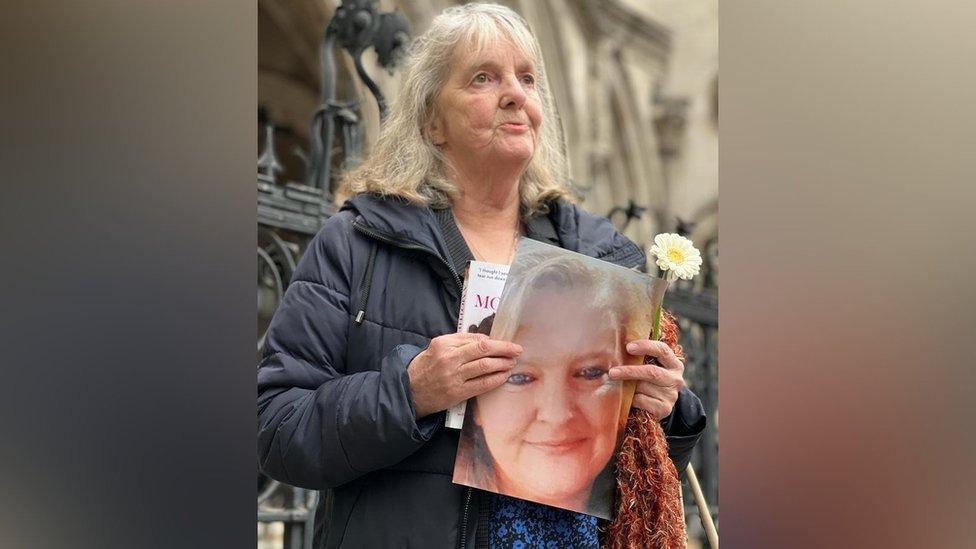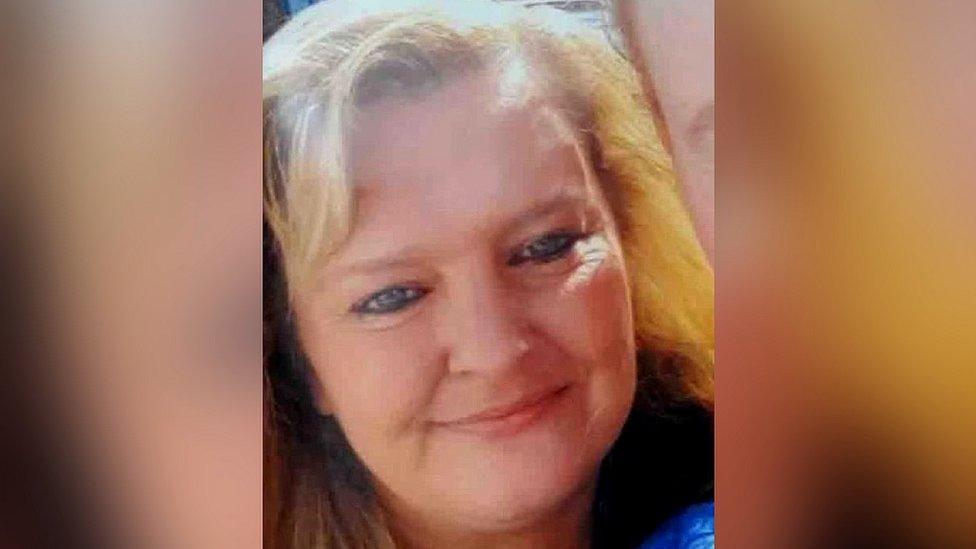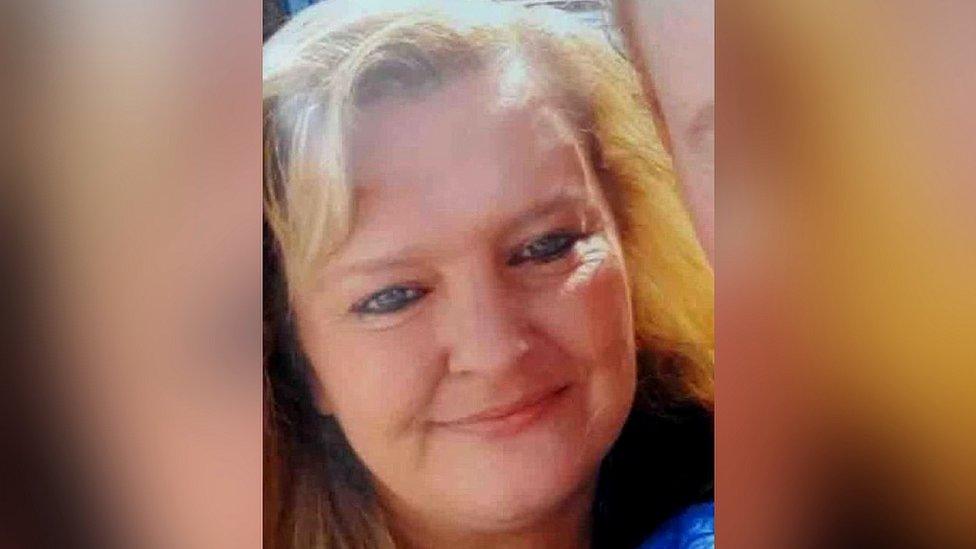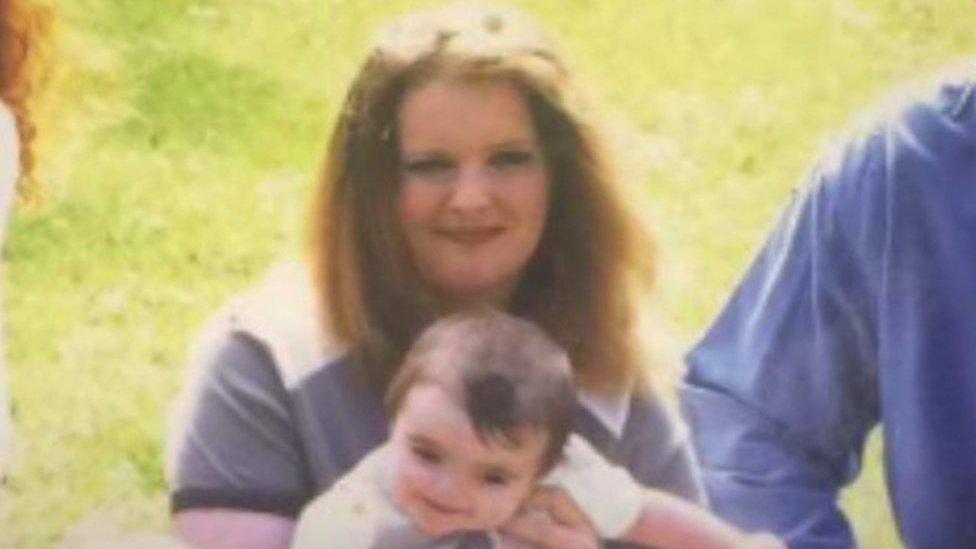Jodey Whiting: New evidence needs fresh inquest, say lawyers
- Published

Joy Dove is at the Court of Appeal calling for a fresh inquest into her daughter Jodey's death
New evidence about the wrongful ending of a woman's benefits and her suicide should be considered by a fresh inquest, the Court of Appeal has heard.
Jodey Whiting died in February 2017 after her disability benefits were incorrectly stopped by the Department of Work and Pensions (DWP).
An inquest concluded the vulnerable 42-year-old took her own life, but her family want a new inquest to consider the impact of the DWP's actions on her.
A two-day hearing is under way.
Lawyers for Ms Whiting's mother, Joy Dove, said the original conclusion of suicide - after a 37 minute-long inquest - was not being criticised but "fresh evidence changes the picture completely".
Jeremy Hyam KC said there would be "real value" in a new inquest with two new pieces of evidence to consider.

Jodey Whiting had a history of chronic pain and mental health issues which left her unfit to work
The first is a report by the Independent Case Examiner, external (ICE) that identified multiple DWP failings in Ms Whiting's case, including a failure to follow the department's own guidance on reducing a vulnerable person's suicide risk.
The second is a psychiatrist's review which said there was "likely" to be a direct link between the wrongful cessation of the benefits and Ms Whiting's mental state and decision to kill herself.
The court heard Ms Whiting was a "much-loved daughter, mother and grandmother" who had a history of chronic pain and mental health problems including the repeated expression of suicidal thoughts and drug overdoses as well as a borderline personality disorder.
She had been on benefits for a number of years but had to undergo reassessment in 2016 during which the DWP failed to contact her GP about her health history and ignored her request for a home visit.

Inquest appeal timeline:
November 2020 - Office of the Attorney General grants permission for Ms Dove to apply to the High Court for a second inquest
September 2021 - High Court dismisses the application
October 2021 - Ms Dove applies to the High Court for permission to appeal against this decision, but is refused
November 2021 - She then applies to the Court of Appeal for the same permission to appeal
October 2022 - Court of Appeal grants permission, meaning Ms Dove can challenge the September 2021 decision not to hold a second inquest
January 2023 - Two-day hearing begins at Court of Appeal in front of three judges

Ms Whiting's benefits were stopped in February 2017 when she missed a face-to-face meeting.
However, the DWP did not follow its own safeguarding guidance of calling her to find out why she missed it or make a welfare check on her before cancelling the payments, the court heard.
Numerous handwritten notes were found next to Ms Whiting's body at her Stockton home days later which the appeal judges said were "sad and distressing".
The High Court ruled out a fresh inquest because the failings by the DWP had been investigated by the ICE report and accepted by the department.
Appealing against that decision, Mr Hyam said what still needed to be investigated was the "causal connection" between the failings and Ms Whiting's death.
'Terrible loss'
He said that there was a "public interest" in further examination of the "risks of cessation of benefits" for vulnerable people.
Mr Hyam said a new coroner could make a narrative conclusion or a preventing further deaths report, as has happened in similar cases, which would be useful for the DWP and could support the family's hope that the "same thing will not happen to somebody else".
Representing the coroner's service, Jonathan Hough KC said assistant coroner Jo Wharton, who held the first inquest, acknowledged it was "a tragic case" and Ms Whiting's family had "suffered a terrible and irreparable loss".
He said Ms Wharton had not intended to "defend" the DWP failings but the inquest was appropriate and "sufficient".
Mr Hough said she accepted it was a "brief" hearing but that was "not unusual" for an inquest where the cause of death and suicidal intent were "tragically clear".
Speaking before the hearing, Ms Dove told the BBC her daughter "shouldn't have suffered", adding: "She shouldn't have gone through those weeks of torture that they put her through."
The DWP has previously apologised for its failings and its lawyers are due to address the Court of Appeal later.
The hearing continues.

Follow BBC North East & Cumbria on Twitter, external, Facebook, external and Instagram, external. Send your story ideas to northeastandcumbria@bbc.co.uk, external.
Related topics
- Published5 October 2022

- Published3 November 2021

- Published1 October 2021

- Published17 September 2021

- Published22 June 2021
